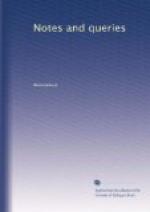Whit-sonday was, therefore, the day on which the Apostles were endued by God with wisdom and knowledge: and my Query is, whether the root of the word may not be found in the Anglo-Saxon verb,—
Witan, to know, understand (whence our wit, in its old meaning of good sense, or cleverness and the expression “having one’s wits about one,” &c.); or else, perhaps, from—
Wisian, to instruct, show, inform; (Ger. weisen). Not being an Anglo-Saxon scholar, I am unable of myself to trace the formation of the word witson from either of these roots: and I should feel greatly obliged to any of your correspondents who might be able and willing to inform me, whether that form is deduceable from either of the above verbs; and if so, what sense it would bear in our present language. I am convinced, that wisdom day, or teaching day, would afford a very far better reason for the name now applied to Pentecost, than any of the reasons commonly given. I should observe, that I think it incorrect to say Whit-Sunday. It should be Whitsun (Witesone) Day. If it is Whit Sunday, why do we say Easter Day, and not Easter Sunday? Why do we say Whitsun-Tide? Why does our Prayer Book say Monday and Tuesday in Whitsun-week (just as before, Monday and Tuesday in Easter-week)? And why do the lower classes, whose “vulgarisms” are, in nine cases out of ten, more correct than our refinements, still talk about Whitsun Monday and Whitsun Tuesday, where the more polite say, Whit Monday and Tuesday?
Query II. As I am upon etymologies, let me ask, may not the word Mass, used for the Lord’s Supper—which Baronius derives from the Hebrew missach, an oblation, and which is commonly derived from the “missa missorum”—be nothing more nor less than mess (mes, old French), the meal, the repast, the supper? We have it still lingering in the phrase, “an officers’ mess;” i.e. a meal taken in common at the same table; and so, “to mess together,” “messmate,” and so on. Compare the Moeso-Gothic mats, food: and maz, which Bosworth says (A.-S. Dic. sub voc. Mete) is used for bread, food, in Otfrid’s poetical paraphrase of the Gospels, in Alemannic or High German, published by Graff, Konigsberg, 1831.
H.T.G.
Clapton.
[Footnote 1: The places in the New Testament, where Divine Wisdom and Knowledge are referred to the outpouring of God’s Spirit, are numberless. Cf. Acts, vi. 3., 1 Cor. xii. 8., Eph. i. 8, 9., Col. i. 9., &c. &c.]
* * * * *
FOLK LORE.
Sympathetic Cures.—Possibly the following excerpt may enable some of your readers and Folklore collectors to testify to the yet lingering existence, in localities still unvisited by the “iron horse,” of a superstition similar to the one referred to below. I transcribe it from a curious, though not very rare volume in duodecimo, entitled Choice and Experimental Receipts in Physick and Chirurgery, as also Cordial and Distilled Waters and Spirits, Perfumes, and other Curiosities. Collected by the Honourable and truly learned Sir Kenelm Digby, Kt., Chancellour to Her Majesty the Queen Mother. London: Printed for H. Brome, at the Star in Little Britain, 1668.




